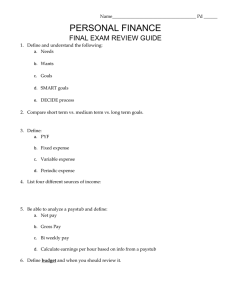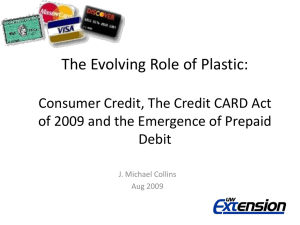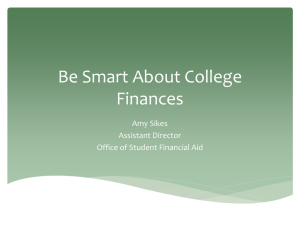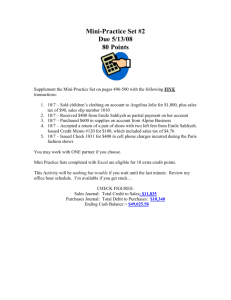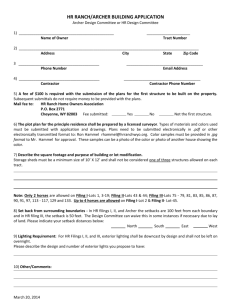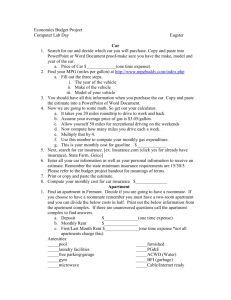Take the Credit Card Challenge! Credit card terms are very complex
advertisement
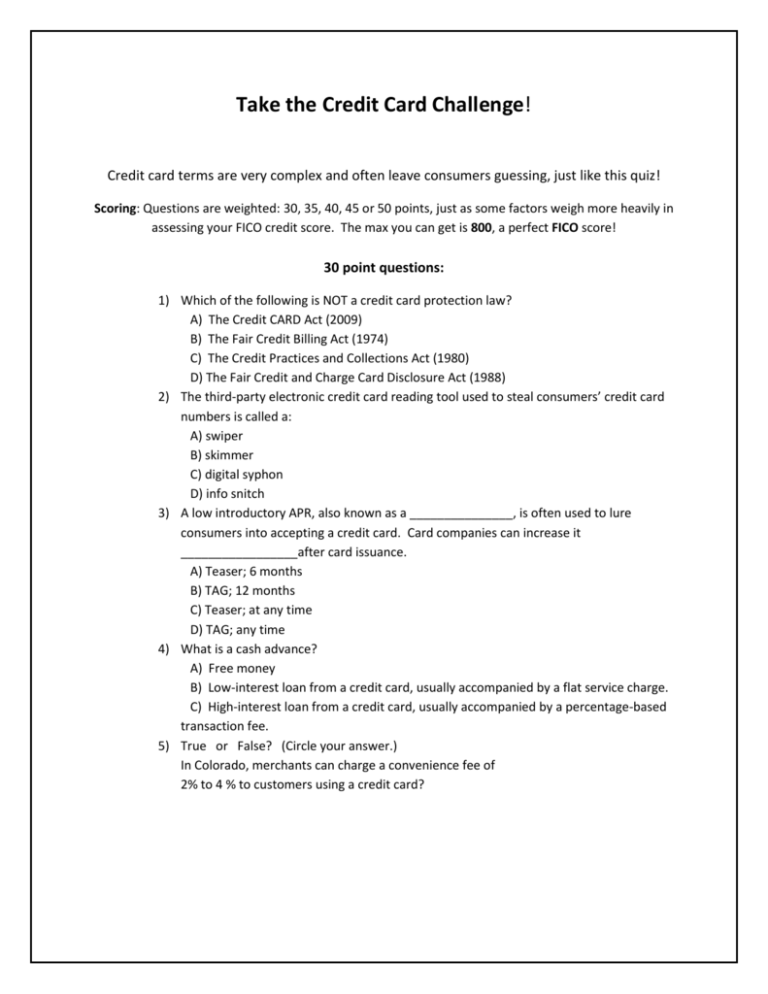
Take the Credit Card Challenge! Credit card terms are very complex and often leave consumers guessing, just like this quiz! Scoring: Questions are weighted: 30, 35, 40, 45 or 50 points, just as some factors weigh more heavily in assessing your FICO credit score. The max you can get is 800, a perfect FICO score! 30 point questions: 1) Which of the following is NOT a credit card protection law? A) The Credit CARD Act (2009) B) The Fair Credit Billing Act (1974) C) The Credit Practices and Collections Act (1980) D) The Fair Credit and Charge Card Disclosure Act (1988) 2) The third-party electronic credit card reading tool used to steal consumers’ credit card numbers is called a: A) swiper B) skimmer C) digital syphon D) info snitch 3) A low introductory APR, also known as a _______________, is often used to lure consumers into accepting a credit card. Card companies can increase it _________________after card issuance. A) Teaser; 6 months B) TAG; 12 months C) Teaser; at any time D) TAG; any time 4) What is a cash advance? A) Free money B) Low-interest loan from a credit card, usually accompanied by a flat service charge. C) High-interest loan from a credit card, usually accompanied by a percentage-based transaction fee. 5) True or False? (Circle your answer.) In Colorado, merchants can charge a convenience fee of 2% to 4 % to customers using a credit card? 35 point questions: 6) To place a fraud alert on your credit file, you would contact which credit bureau? A) Equifax B) Experian C) Transunion D) Any of the above 7) Which slogans go with which credit cards? ____Visa A. “Don’t leave home without it.” ____MasterCard B. “It pays to (name of card).” ____American Express C. “It’s everywhere you want to be.” ____Discover D. “There are some things money can’t buy. For everything else, there’s (name of card).” 8) What type of credit card offers features such as travel insurance and product warranties? A) Secured B) Retail C) Affinity D) Premium 9) What federal law regulates companies using consumers’ personal info and entitles you to a free annual credit report? A) The Equal Credit Opportunity Act (1974) B) The Fair Credit Reporting Act (1970) C) The Credit CARD Act (2009) D) The Fair Credit Reporting Act (1970) 10) What is the average amount of credit card debt for U.S. credit cardholders? A) $2,000 to $4,000 B) $4,001 to $5,000 C) $5,001 to $6,000 D) more than $6,000 40 point questions: 11) What is the average credit card APR rate in the U.S.? A) 12% B) 15% C) 22% D) 26% 12) They can charge annual fees. They make it easier to spend more than you initially intended to spend. They are associated with fees and penalties. What are they? A) Credit cards B) Debit cards C) Both credit and debit cards 13) What lists the fee names and fee amounts for a debit card? A) The fee schedule B) The Terms and Conditions C) The credit card prenuptial agreement D) The back of a consumer’s credit card statement 14) Which type of credit card hijacking is legal? A) ID theft B) Continued charging for a subscription, good or service that the card owner no longer wanted C) None of the above 15) If you find an error on your credit report, and the creditor or the credit bureau will not remove it, who should you file a complaint with? A) Better Business Bureau B) Department of Intelligence C) The Consumer Financial Protection Bureau D) A licensed financial representative in your state of residence 45 point questions: 16) A poor credit score could affect your ability to do the following: A) Get a job B) Make purchases, such as a home or insurance C) Receive a lower interest rate on a loan D) All the above 17) The following actions could negatively affect your credit rating: A) Defaulting on a student loan B) Not correcting an error on your credit report C) Maxing out a credit card D) All the above 18) If your card is stolen, the most you will owe in unauthorized charges for a credit card is ______. The most you could lose for a stolen debit card is ______. A) $50; the entire amount your entire account B) $500; $50 C) $50; $500 D) The entire amount of stolen goods; the entire amount in your account 19) True or False? (Circle your answer.) The amount of interest a credit card company is allowed to charge is limited by the federal government. 20) If you were to file Chapter 7 bankruptcy due to the inability to repay your debts, what part of your credit card debt may not be discharged? A) All but cash advances and/or purchases of $1,000 or more for luxury goods or services made within 60 days of filing. B) All but cash advances and/or purchases of $1,150 or more for luxury goods or services made within 60 days of filing. C) All but cash advances and/or purchases of $2,500 or more for luxury goods or services made within 60 days of filing. D) All but purchases for luxury goods or services made within 60 days of filing. ***Bonus Question, worth 50 points: What is the mathematical formula for calculating compound interest? - - - - - - - - - - - - - - - - - - - - - - - - - - - - - - - - - - - - - - - - - - - - - - - - - - - - - Visit https://www.optoutprescreen.com/ to opt out of receiving future credit card offers. Visit http://www.federalreserve.gov/creditcard/ to learn just about everything you would ever want to know about credit cards, including how to file a complaint against your credit card company that they are not helping you resolve. Answer key: 1) C, 2) B, 3) A, 4) C, 5) False, 6) D, 7) C, D, A, B, 8) D, 9) B, 10) D, 11) B, 12) C, 13) A, 14) B, 15) C, 16) D, 17) D, 18) A, 19) False, 20) B Bonus question:
